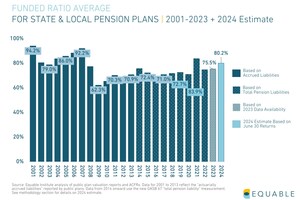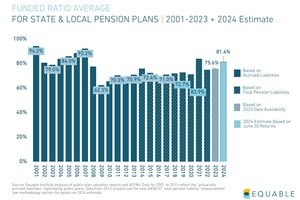Report Finds K-12 Pension Debt Costs Threaten Education Equity in Florida
NEW YORK, Jan. 31, 2023 /PRNewswire/ -- Equable Institute and Opportunity Institute have released new research exploring the effect of teacher pension debt on education resource equity in Florida.
The report, titled Pension Debt Challenges for Equity in Education: The Effect of Teacher Unfunded Liability Costs on K–12 Education Funding in Florida, found that growing unfunded pension liabilities for teachers and other school employees have silently undermined Florida's ability to improve education outcomes for students and inequitable impacts on teachers through growing, unpredictable costs and regressive funding policies that effectively subsidize wealthy districts.
"The growth in costs to fund the Florida Retirement System have been like a slow boil, only recently catching the attention of district leaders and likely still not on the radar of everyone who cares about K-12 funding," said Anthony Randazzo, executive director at Equable. "However, with FRS unfunded liabilities persisting and reaching over $5,000 per student it is time to pay attention the effects of requiring school districts to pay for 100% of the costs of teacher pension debt. Annual FRS costs may not be large as a share of school district resources today, but they've been growing steadily since 2012 and they should be addressed before they become a significant problem in the future."
Specifically, the report finds:
- An increasing share of state and local K–12 education spending has been siphoned off to cover pension costs, even after major changes to the Florida Retirement System in 2012.
- In 2020, 2.5% of Florida's school district expenditures on education funding ultimately went to FRS, more than double the amount paid in 2012, the year of Florida's last major cost cutting changes.
- School districts pay all FRS costs. As a result, the $1.2 billion spent on retirement costs accounts for 3.5% of local revenue provided for K–12 spending as of 2020.
- These growing pension costs are effectively education funding cuts that disproportionately harm low-income communities.
- Total retirement contributions to FRS have almost tripled since 2001. The majority of those contributions come from districts. Low-income communities that have fewer resources are more heavily burdened by rising contribution rates as they are limited in their ability to offset rising costs by generating income through local property taxes.
- Pension debt now accounts for nearly 27.81% of total K-12 spending per student. It was just 4.68% in 2014. These rising pension debt costs are regressive and pass a greater burden to high-poverty districts because Florida distributes the unfunded liability costs evenly across the state event though wealthier school districts generate a greater share of FRS's unfunded liability because of higher teacher salaries.
- Additional contributions from Florida school districts will be likely be required in the coming years unless the state legislature intervenes.
- Actuaries for Florida Retirement System have already requested a contribution rate increase for the 2023-24 fiscal year that would raise the average employer contribution above 16% of payroll for the first time in recent history. This is also twice the employer contribution rate required in 2012 the first year after Florida's last attempt to reform FRS.
Opportunity Institute and Equable Institute note that without increased transparency on how public school employee retirement benefits impact overall school budgets, pension debt costs will continue to exacerbate already existing education resource Inequities.
"It is time for transparency in how much school districts are having to pay to cover the costs of FRS unfunded liabilities, especially so that we can address the inequitable distribution of cost between well-resourced districts and low-income communities" Maria Echaveste, president of Opportunity Institute. "Schools with lower resources are more vulnerable to the effects of increased contribution rates, and higher and higher costs not only threaten enrichment and learning programs that are crucial to providing a holistic education, but investments that support teachers like higher pay and adequate retirement benefits."
This report is one of four reports detailing the impact of unique pension debt challenges facing state education budgets across the U.S. Please visit pensionequityineducation.org to download Florida's report along with reports for California, Texas, and Ohio.
Equable Institute and Opportunity Institute will be hosting webinars covering the findings of each of the reports in March 2023.
Click here to sign up to be notified when registration opens.
The Opportunity Institute (OI) is a national education policy organization that focuses broadly on cradle-to-career education policy, practice issues, and adjacent areas of social policy. Our work bridges the domains of policy, research, advocacy, and addresses equity in three main areas of work: "Whole Child" equity; resource equity; equity indicators.
Equable is a bipartisan non-profit that works with public retirement system stakeholders to solve complex pension funding challenges with data-driven solutions. We exist to support public sector workers in understanding how their retirement systems can be improved, and to help state and local governments find ways to both fix threats to municipal finance stability and ensure the retirement security of all public servants.
SOURCE Equable Institute

WANT YOUR COMPANY'S NEWS FEATURED ON PRNEWSWIRE.COM?
Newsrooms &
Influencers
Digital Media
Outlets
Journalists
Opted In





Share this article